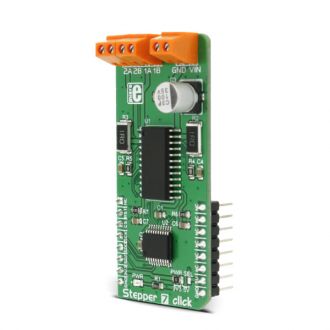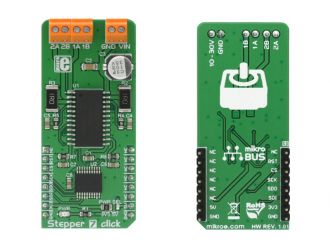
We strongly encourage users to use Package manager for sharing their code on Libstock website, because it boosts your efficiency and leaves the end user with no room for error. [more info]

Rating:
Author: MIKROE
Last Updated: 2018-02-08
Package Version: 1.0.0.0
mikroSDK Library: 1.0.0.0
Category: Stepper
Downloaded: 6454 times
Not followed.
License: MIT license
Stepper 7 click is a bipolar step motor driver. It features an H-bridge bipolar step motor driver, which supports full, half and micro-step control modes.
Do you want to subscribe in order to receive notifications regarding "Stepper 7 click" changes.
Do you want to unsubscribe in order to stop receiving notifications regarding "Stepper 7 click" changes.
Do you want to report abuse regarding "Stepper 7 click".


Library description
This library carries everything needed for stepper motor control, including speed and acceleration setup. The library can be adjusted to work on the different amount of ticks per second. Also, speed and acceleration can be provided in float format. The buffer used for movement calculation is defined by the user in order that the library can be adjusted for MCUs with very limited RAM resources. Check the documentation for more details how to use it.
Key functions
uint8_t stepper7_setSpeed( float minSpeed, float maxSpeed, float accelRatio, T_STEPPER7_OBJ obj ) - Sets up the motor speed
uint8_t stepper7_setRoute( const uint8_t direction, uint32_t steps, T_STEPPER7_OBJ obj ) - Sets up a new route
void stepper7_start( T_STEPPER7_OBJ obj ) - Starts motor movement
The application is composed of three sections :
void applicationTask()
{
stepper7_start( (T_STEPPER7_OBJ_P)&myStepper );
while( myStepper.status.running )
stepper7_process( (T_STEPPER7_OBJ_P)&myStepper );
Delay_ms( 2000 );
}
In addition to library function calls, example carries necessary Timer ISR and Timer initialization. Check Timer initialization settings and update it according to your MCU - Timer Calculator.
Additional notes and information
Depending on the development board you are using, you may need USB UART click, USB UART 2 click or RS232 click to connect to your PC, for development systems with no UART to USB interface available on the board. The terminal available in all MikroElektronika compilers, or any other terminal application of your choice, can be used to read the message.